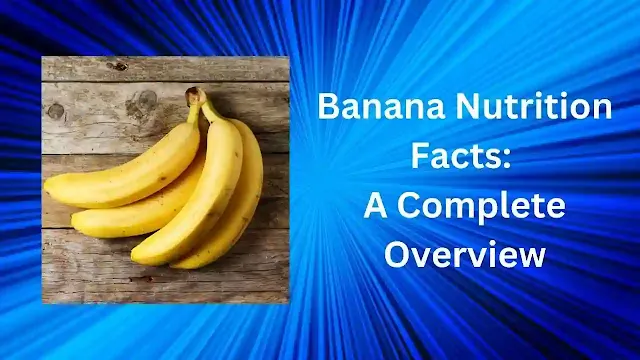Banana Nutrition Facts: A Complete Overview
Banana Nutrition Facts: A Complete Overview - Bananas are among the most popular fruits globally, known for their sweet taste, convenient peel, and portability, making them a perfect snack for all ages. Beyond their delicious flavor, bananas are packed with essential nutrients that offer significant health benefits.
In this post, we'll break down the nutrition facts
of bananas, explore their health benefits, and provide tips for incorporating
them into your diet.
Nutritional Breakdown of Bananas
A medium banana (about 7-8 inches long, weighing approximately
118 grams) is packed with nutrients. Here's a quick look at its nutritional
profile:
- Calories: 105
- Carbohydrates: 27 grams
- Sugars: 14 grams (mostly fructose and glucose)
- Dietary fiber: 3 grams
- Fat: 0.3 grams
- Protein: 1.3 grams
- Vitamins:
- Vitamin C: 10% of the Daily Value (DV)
- Vitamin B6: 20% of the DV
- Folate: 6% of the DV
- Minerals:
- Potassium: 422 mg (12% of the DV)
- Magnesium: 8% of the DV
- Manganese: 15% of the DV
- Water content: 74%
Key Nutritional Highlights
Carbohydrates
Bananas are primarily composed of carbohydrates,
which makes them a great energy source. These carbohydrates come in the form of
sugars and dietary fiber. The natural sugars provide a quick energy boost,
while fiber helps regulate blood sugar levels by slowing down glucose
absorption.
Vitamins and Minerals
Bananas are rich in several essential vitamins and
minerals:
- Potassium is a key nutrient in bananas, vital for maintaining fluid balance, regulating blood pressure, and supporting muscle and nerve function. Its heart health benefits include reducing the risk of stroke by balancing sodium's effects on blood pressure.
- Vitamin C serves as an antioxidant that helps protect against oxidative stress, supports immune function, and aids iron absorption from plant-based foods.
- Vitamin B6 plays a role in brain health and metabolism, assisting in the production of neurotransmitters, hormones, and red blood cells.
- Magnesium contributes to muscle and nerve function, blood sugar control, and bone health, while folate supports cell division and DNA formation.
Dietary Fiber
A medium banana provides 3 grams of dietary fiber,
which promotes digestive health. Fiber aids in regular bowel movements, reduces
constipation, and contributes to a feeling of fullness, which can help with
weight management.
Health Benefits of Bananas
Bananas offer more than just taste; they bring a
host of health benefits. Here are some key advantages of adding bananas to your
diet:
1. Heart Health
The high potassium content in bananas is associated
with better heart health. Studies show that diets rich in potassium may reduce
the risk of hypertension and stroke. Potassium helps relax blood vessels, leading
to lower blood pressure.
2. Digestive Health
Bananas promote digestive health due to their
soluble fiber, which aids in bowel regularity and prevents constipation. They
also act as prebiotics, nourishing beneficial gut bacteria and improving gut
microbiome health.
3. Energy Boost
Bananas are an excellent energy source, especially
before or after a workout. The natural sugars offer a quick energy boost, while
the fiber helps maintain sustained energy levels.
4. Mood Enhancement
Bananas may help improve mood, thanks to their role
in serotonin production. They contain tryptophan, which the body can convert
into serotonin—a neurotransmitter linked to feelings of happiness and
well-being.
5. Weight Management
Due to their fiber content, bananas can help curb
hunger and keep you feeling full longer. Including bananas as part of a
balanced diet can support healthy weight management by controlling appetite.
Incorporating Bananas Into Your Diet
Bananas are incredibly versatile, making them easy
to incorporate into your meals. Here are a few creative ideas:
- Smoothies: Blend bananas with yogurt, spinach, and berries for a nutritious smoothie.
- Oatmeal: Add sliced bananas to your oatmeal for natural sweetness and fiber.
- Baking: Use mashed bananas in banana bread or muffins as a natural sweetener and moisture source.
- Snacks: Pair banana slices with nut butter or yogurt for a satisfying, protein-packed snack.
- Frozen Treats: Freeze banana slices for smoothies or enjoy them on their own as a healthy frozen snack.
Last Words
Bananas are not just a convenient snack but a nutritional powerhouse. With benefits ranging from heart health to mood improvement, they deserve a spot in your daily diet. Whether eaten on their own, blended into smoothies, or used in baking, bananas are a versatile and healthy addition to any meal plan. So, why not enjoy one today and take a step toward better health?
Also Read: Why is Nutrition Important to Health






